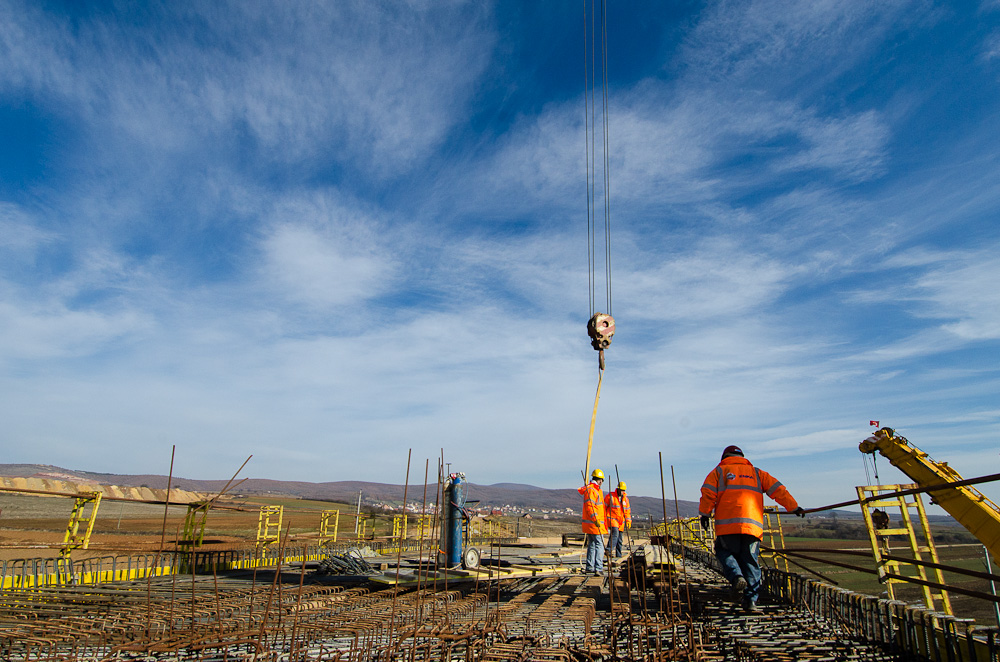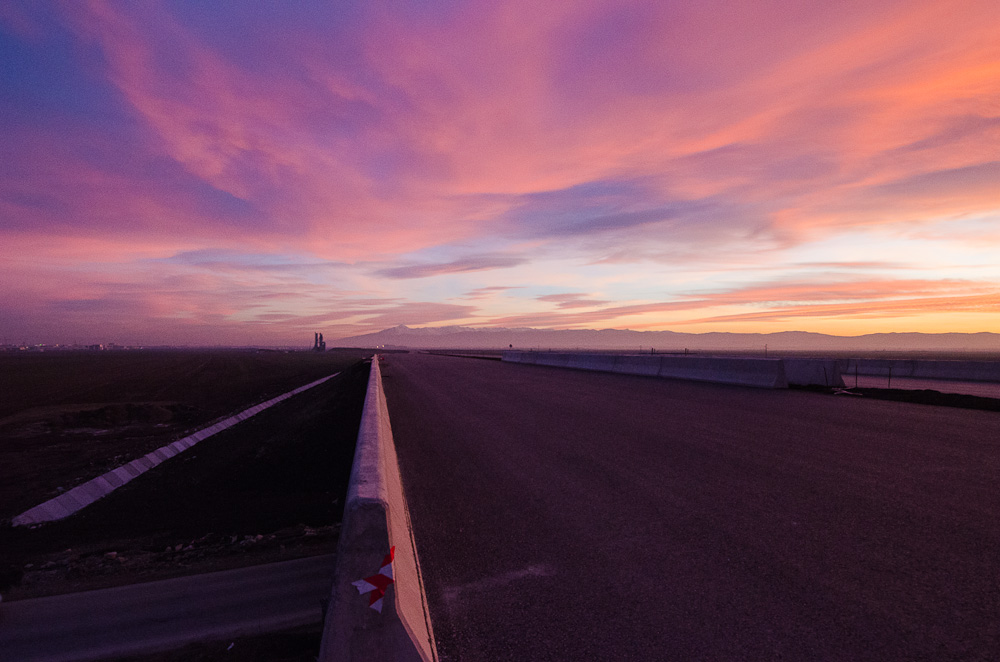The new Prishtina-Skopje highway has been touted as a major boost to trade with Kosovo’s neighbors – but experts say the economic benefits are unclear, and the project also lacks transparency.
But the KDI and the public still do not have access to the part of the contract in which the Kosovo government agreed to pay a fine of 53 million euros for not fulfilling payment requests submitted by the construction companies in 2014, or to the part that extended the completion date, requested by the government, from January 18, 2018 to December 31, 2018.
“This was a poorly negotiated contract and perhaps the worst managed by the government, so creating possibilities for penalties,” Metushi-Krasniqi told BIRN.

Bechtel/Enka construction workers build an overpass between the village of Babush and Cernille, Ferizaj so that people from the villages surrounding Route 6 can have access to the new motorway. Photo: Valerie Plesch.
Construction of the highway started in 2014. It was supposed to finish early in 2018. But in September 2017, the government reached an agreement with Bechtel Enka to open the highway at the end of 2018 instead.
“The KDI also found that the Ministry [of Infrastructure] had extended the time of completion again, from December 31 2018 to June 1 2019, eliminating the possibility of penalties from the contractor,” said Metushi Krasniqi.
This extension was made to accommodate the budgetary problems of the Kosovo government, she noted.
BIRN asked the Ministry of Infrastructure to explain why it extended the time limit in the contract, but it has not responded.
“The problem with the payment requests”, added Metushi-Krasniqi, “is that, under the contract, these are non-binding estimates that should have been submitted quarterly, not as annual round-ups. This way, we lost 53 million euros on a non-binding estimate.”
Previous governments knew about the looming penalties due to delays in work and delays in payment, but did not react fast enough to minimize or prevent them. If they did react, they never managed to sign a new annex on them to the agreement, the KDI has reported.
Interestingly, in June 2018, when the government declared it did not have the money in hand to pay construction firms Bechtel & Enka, around 300 million euros was in fact available for the execution of projects, but was not used.
This money was taken as loans from international financial institutions, according to a report of the Kosovo National Audit Office.
High investment for questionable return
The two companies that constructed the motorway, the US company Bechtel and its Turkish partner, Enka, signed the contract in July 2014 for 600 million euros.
They beat the other bidder, Cooperativa Muratori & Cementisti, C.M.C. of Ravenna and Dogus, which sought a higher price. The outgoing infrastructure minister, Fehmi Mujota, signed the contract on July 1, 2014.
The government has paid for the highway from its budget for capital investment. One third of the total 2019 budget is also earmarked for infrastructure projects.

A view of the motorway ‘Arben Xhaferi’ near the town of Kacanik. The construction of the motorway is 60 km long, has a budget of 600 million euro, started in July 2014 and it is scheduled to be finished in late 2018. EPA-EFE/VALDRIN XHEMAJ.
“After construction is finished, there will be a final report on the final cost by Hill International [construction consulting company],” Rexhep Kadriu, the Vice-Minister of Infrastructure said in January.
Hill International in 2015 warned that the government had entered into liabilities without having a Requirements of the Employer Document and Payment Plan, and recommended an extension of the contract deadline because of the budget limitations.
The highway has been touted as a gateway for investment and trade, as it will speed up connections between the Kosovo market, North Macedonia and Greece.
Thessaloniki will be reachable in less than 4 hours’ drive. This may increase Greek and North Macedonian trade with Kosovo.
It will also ease access for Kosovars to Skopje airport, which offers more competitive prices than the home airport in Prishtina.
Flight from here are usually more expensive owing to Kosovo’s unresolved dispute with Serbia over its independence. As a result, flights from Kosovo cannot cross Serbian airspace and have to go through North Macedonia or Montenegro, which takes more time and is longer.
But Metushi-Krasniqi questions the likely trade benefits for Kosovo of the highway, given that North Macedonia sells far more to Kosovo than it buys.
“Considering the huge gap between imports and exports with North Macedonia, for the time being this motorway will be more profitable for Macedonia than Kosovo,” she suggested.
Kosovo six months ago imposed a 100-per-cent tariff on goods from Serbia, which has created gaps in the market. As media reports have noted, North Macedonia has increased its exports to Kosovo since last year.
Although Kosovo has now spent billions on road infrastructure, according to Trading Economics, GDP earned from transport in 2018 decreased in comparison to 2017.
To its north side, close to Prishtina, the new highway connects with the highway named after former president Ibrahim Rugova, which runs from Kosovo to Albania.
To give the costly project patriotic weight, Hashim Thaci, now President and then Prime Minister, named the new highway after Arber Xhaferi, the ethnic Albanian politician who signed the peace agreement in Macedonia between the government in Skopje and the country’s ethnic Albanian minority, ending an armed conflict there in 2001.
But highways with patriotic themes seem to cost Kosovo a lot. The highway to Albania was one of the most expensive highways built in Europe – and was also marked by a lack of transparency and by accusations of corruption.






